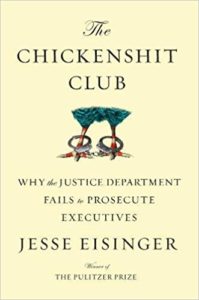Editor’s Note: I did a podcast with Jesse Eisinger for the finance website Make Change, in which we discuss his book in further detail. I recommend listening to it here!
Nine years after the Great Recession mortgage bond crisis of 2008, no executives with any seniority on Wall Street faced criminal consequences. Although a few suffered civil penalties like fines, the lack of jail time left many asking, why?
 September 2017 marks the ninth anniversary of the most explosive month of the Great Recession. Over one dramatic weekend nine years ago, legendary Wall Street firm Lehman Brothers declared bankruptcy, brokerage giant Merrill Lynch threw itself desperately into the arms of Bank of America, and insurance conglomerate AIG became an 80% ward of the federal government. That very bad weekend in mid-September followed hot on the heels of the previous week’s fireworks, in which mortgage giants Fannie Mae and Freddie Mac entered “conservatorship” status with the Federal Housing Finance Agency.
September 2017 marks the ninth anniversary of the most explosive month of the Great Recession. Over one dramatic weekend nine years ago, legendary Wall Street firm Lehman Brothers declared bankruptcy, brokerage giant Merrill Lynch threw itself desperately into the arms of Bank of America, and insurance conglomerate AIG became an 80% ward of the federal government. That very bad weekend in mid-September followed hot on the heels of the previous week’s fireworks, in which mortgage giants Fannie Mae and Freddie Mac entered “conservatorship” status with the Federal Housing Finance Agency.
Like a ghost revived from horrors past, on September 11, 2017, the Justice department brought civil charges against Deutsche Bank mortgage bond trader Paul Mangione for fraudulently structuring sub-prime mortgage bonds back in April 2007, more than ten years ago. Mangione doesn’t face jail time, but rather civil penalties such as fines. So, we’re still reaping the consequences of the subprime mortgage debacle more than 10 years later, and still nobody’s going to jail.
My personal, deeply unpopular, view is that financial executives didn’t go to jail from the sub-prime mortgage crisis because they didn’t commit crimes. Poor money management is not a crime, nor is losing money for your firm or investors. Executives were guilty of believing too deeply in a flawed financial model or failing to respond quickly enough to systemic risks, but that’s a series of human errors, not jailable offences. Many observers of the sub-prime mortgage crisis disagree with me.
Jesse Eisinger, a Pulitzer Prize-winning financial journalist, just published a book this summer, called The Chickenshit Club: The Justice Department and Its Failure to Prosecute White-Collar Criminals, disagreeing with me. I mean, he’s not literally rebutting my argument, but rather he’s explaining the complex history of why nobody went to jail for the mortgage sub-prime crisis and the Great Recession more broadly.
As a general rule, I think it’s a tonic to learn from smarter, better-researched people who disagree completely with me. So I recommend the book whether you agree or disagree with me.
Eisinger’s answer to the question of “why no jail time?” as hinted at by his profane title, is that institutional weaknesses in the US justice system, from the SEC to the Justice Department to especially the Southern District of New York, made them unwilling and unable to catch white collar criminals and put them in jail.
Eisinger contrasts the earlier experience of the Enron prosecutions of criminal behavior by executives following the 2001 collapse of the trading giant with the absence of criminal prosecutions of Wall Street executives involved in the sub-prime mortgage collapse. So what changed between 2001 and 2008? In Eisinger’s telling, many factors combined.
First, a backlash developed against the damage caused by the aggressive prosecution of Enron’s accounting firm Arthur Anderson, a former “Big-5” accountancy, which drove them out of business in 2002.
Government prosecutors worried about the kind of collateral damage – to innocent employees, customers, investors – if they took down Wall Street firms, especially given how weak big firms were in the aftermath of 2008.
Second, prosecutors developed a preference for reaching a new kind of agreement called a “Deferred Prosecution Agreement,” (DPA) in which corporations – but importantly not individuals – agreed to pay fines as a result of bad actions. Typically a DPA meant a hefty corporate fine, ultimately paid by shareholders rather than executives, and an agreement to hire an outside monitor against future ongoing bad behavior.
Not incidentally, these monitoring agreements became extremely lucrative for big private law firms, encouraging a kind of Big Law lobby for more DPAs in place of criminal prosecutions.
Next, he describes a classic kind of regulatory revolving door between government prosecutors and lucrative white-collar defense practices. Eisinger believes many ambitious prosecutors want to eventually make ten times more money in private practice defending white collar criminals. So, they might not want to be overly aggressive prosecuting white collar criminals that could be their future private practice employers.
Finally, Eisinger describes prosecuting white collar crime as a particular skill, requiring a certain institutional culture of risk-taking and a consequences-be-damned attitude. Between the Enron/Arthur Anderson backlash and the rise of DPAs, our regulators lost their taste for putting executives behind bars. Running up the score with DPAs and corporate civil fines became easier than the more difficult task of jailing executives.
Interestingly, legal heavyweights making 2017 headlines such as James Comey, Preet Bharara, Eric Holder, Sally Yates, and Bob Mueller make cameos in Eisinger’s book, often in an unflattering, or at least mixed, context.
 I spoke to Eisinger about his book recently. As a former mortgage and CDO salesman myself, I tried to explain, the actions of Wall Street folks described in civil complaints about sub-prime mortgage securitizations fell within a normal range of activity of how we did our jobs. Eisinger didn’t buy it.
I spoke to Eisinger about his book recently. As a former mortgage and CDO salesman myself, I tried to explain, the actions of Wall Street folks described in civil complaints about sub-prime mortgage securitizations fell within a normal range of activity of how we did our jobs. Eisinger didn’t buy it.
But even reading the September 2017 civil suit about Paul Mangione at Deutsche Bank, I’m struck by how banal the complaint is. Mangione’s emails and phone records show he is deeply skeptical about the quality of mortgage underwriting standards. He neither created those mortgages nor had any real ability to influence their creation. His job was to take the product he received and try to make bonds he could sell out of them. To refuse to do that would be to refuse his way out of a job, at least a job as a sub-prime mortgage trader at Deutsche Bank.
I remain skeptical. Eisinger’s right to point out the troubling weaknesses in our current system of prosecuting white-collar criminals. I stick to my often unpopular stance that the sub-prime mortgage and CDO traders did not commit crimes for which they deserved jail.
a version of this ran in the San Antonio Express News and Houston Chronicle.
Please see related posts:
All Bankers Anonymous Book Reviews in One Place!
Mortgages Part VIII – The causes of the crisis
Post read (321) times.


